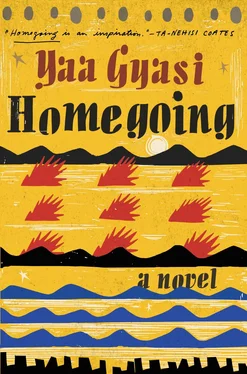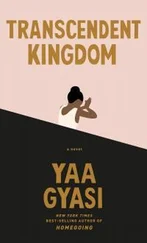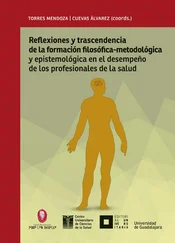At the door, Nana Serwah was sobbing and screaming. “My son-o! My son! My son-o! My son!” Then Akua’s growing ear heard a new sound. Loud step. Space. Loud step. Space.
“What is the Fat Man doing here?” Asamoah asked. His voice was loud enough that Akua considered moving, but it was as though she were in the dream space again, unable to make her body do what her mind wanted it to.
Nana Serwah could not answer her son, so busy was she in her wailing. The Fat Man moved, his enormous girth a boulder rolling to reveal the door. Asamoah entered the room, but still Akua could not get up.
“What is the meaning of this?” Asamoah roared, and Nana Serwah was shaken from her wailing.
“She was sick. She was sick, so we…”
Her voice trailed. Akua could hear the sound again. Loud step. Space. Loud step. Space. Loud step. Space. Then Asamoah was standing in front of her, but instead of two legs, she only saw one.
He crouched down carefully so that their eyes could better meet, balancing so well that Akua wondered how long it had been since he’d last seen the missing leg. He seemed so well acquainted with the space.
He noticed her swollen belly and shuddered. He reached out his hand. Akua looked at it. She had not slept in a week. Ants had begun to pass over her fingers and she wanted to shake them off, or give them to Asamoah, lace her small fingers between his large ones.
Asamoah stood and turned to his mother. “Where are the girls?” he asked, and Nana Serwah, who had started crying anew, this time at the sight of Akua trapped on the ground, ran to fetch them.
Ama Serwah and Abee came in. To Akua they looked unchanged. Both girls still sucked their thumbs, despite the fact that Nana Serwah put hot pepper on the tips of them every morning, noon, and night to warn them away. The girls were developing a taste for heat. They looked from Asamoah to Akua, holding hands with their grandmother, thumbs in mouths. Then, wordlessly, Abee wrapped her entire little body around her father’s leg as though it were a trunk, as though it were the fufu stick she was so fond of holding, stronger than she was, sturdier. The toddler, Ama Serwah, moved closer to Akua, and she could see that she had been crying; a thick line of snot trailed from her nose to lick her upper lip, her mouth gaping wide open. It looked like a slug exiting a cave in order to enter a cavern. She touched her father’s knee, but kept moving to rest where Akua was. Then she lay down beside her. Akua could feel her little heart beating in time with her own broken one. She reached out to touch her daughter, to pull her into her arms, and then she stood and surveyed the room.
*
The war ended in September, and the earth around them began to register the Asante loss. Long fissures in the red clay formed about Akua’s compound, so dry was the season. Crops died, and food was limited, for they had given all they had to the men who were fighting. They had given all they had, assured that it would come back to them in the abundance of freedom. Yaa Asantewaa, Edweso’s warrior Queen Mother, was exiled to the Seychelles, never to be seen again by those who lived in the village. Sometimes Akua would walk by her palace in her wanderings and wonder: What if?
The day she had gotten up from the ground, she had not wanted to speak, nor would she let her children or Asamoah leave her sight. And so the broken family nestled into one another, each hoping the others’ presences would fill the wound their personal war had left behind.
In the beginning, Asamoah did not want to touch her and she did not want to be touched. The space where his leg had been taunted her. She could not figure out how to situate her body next to his while they lay in bed at night. In the past, she would curl into him, one of her legs intertwined between his two, but now she could not get comfortable, and her restlessness fed his restlessness. Akua no longer slept through the night, but Asamoah hated to see her awake and tortured and so she pretended to sleep, allowing the waves of her breasts to rise and fall to the current of breaths. Sometimes Asamoah would turn and stare at her. She could feel him considering her while she pretended to sleep, and if she slipped, opened her eyes or lost her breathing rhythm, his big booming voice would command her to sleep. If she convinced him, she would wait for his real breathing to match her contrived one, and then she would lie there, wishing the firewoman away. If she slept, she would do so only lightly, dipping the ladle of sleep into the shallow pool of dreamland, hoping she would not see the firewoman there before she beckoned herself awake.
Then, one day, Asamoah no longer wanted to sleep. He nuzzled Akua’s neck.
“I know you’re awake,” he said. “I know you do not sleep these days, Akua.”
And still she tried to pretend, ignoring his hot breath against her skin, breathing still and the same.
“Akua,” he said. He had turned his body so that his mouth now met her ear, and the sound of her name was a strong stick hitting a hollow drum.
She did not answer as he continued to speak her name. The first day she’d left the house after her week of exile, the townspeople had looked away as she passed, embarrassed and ashamed of how they had let Nana Serwah treat her. Her mother-in-law too could not see her without bursting into tears, her pleas for forgiveness muffled by the sound. It was only Kofi Poku, the child who had pointed out the white man, the evil one, and so consigned him to burn, who saw the silent Akua and whispered “Crazy Woman.” Crazy Woman. Wife of Crippled Man.
That night, Crippled Man turned Crazy Woman onto her back and entered her, forcefully at first, and then more timidly. She opened her eyes to see him working more slowly than he used to, using his arms to push off, push in, his sweat dripping slowly off the bridge of his nose to land on her forehead and trickle down to meet the floor.
When he finished, Asamoah turned away from her and wept. Their daughters were asleep across from them, thumbs in mouths. Akua turned too. Exhausted, she slept. And in the morning, when she realized that she had not dreamed of fire, she felt that she would be all right. And weeks later, when Nana Serwah snatched baby Yaw from between Akua’s legs with one hand and sliced the cord with the other, when Akua heard his loud and mewling cry, she knew that her son would be all right too.
—
Slowly Akua began to speak more. She slept rarely, but when she did, she would wander. Some days she woke up at the door, other days curled up between her daughters. The sleep time was short, quick, so that as soon as she had moved she was awake again. She would return to her place beside Asamoah, stare at the straw and mud of the roof above them until the sun began to peek through the cracks. Rarely, Asamoah would catch her in her night wanderings while he himself was in midsleep. He’d reach for his machete, then remember his missing leg and give up. Defeated, Akua thought, by his wife and his own misery.
Akua was wary of the villagers, and the only people who brought her any joy were her children. Ama Serwah was speaking real words now, leaving behind the fast and frantic nonsense speech of her early twos. Now no one questioned Akua when she wanted to take long walks with her children. They didn’t question her when she thought a stick was a snake or when she left the food in the fire to burn. When they whispered “Crazy Woman,” they had to do it behind Nana Serwah’s back, because if the woman heard them, she would give them a tongue-lashing that would sting almost as much as the real thing.
Akua would start each walk by asking her daughters where they wanted to go. She would sling baby Yaw in a wrapper around her back and wait for the girls to direct her. Often, they would say the same things. They wanted to walk by Yaa Asantewaa’s palace. The place had been preserved in her honor, and the girls liked to stand outside the gate, singing the postwar songs. Their favorite one was:
Читать дальше

![Ally Carter - [Gallagher Girls 01] I'd Tell You I Love You But Then I'd Have to Kill You](/books/262179/ally-carter-gallagher-girls-01-i-d-tell-you-i-lo-thumb.webp)










